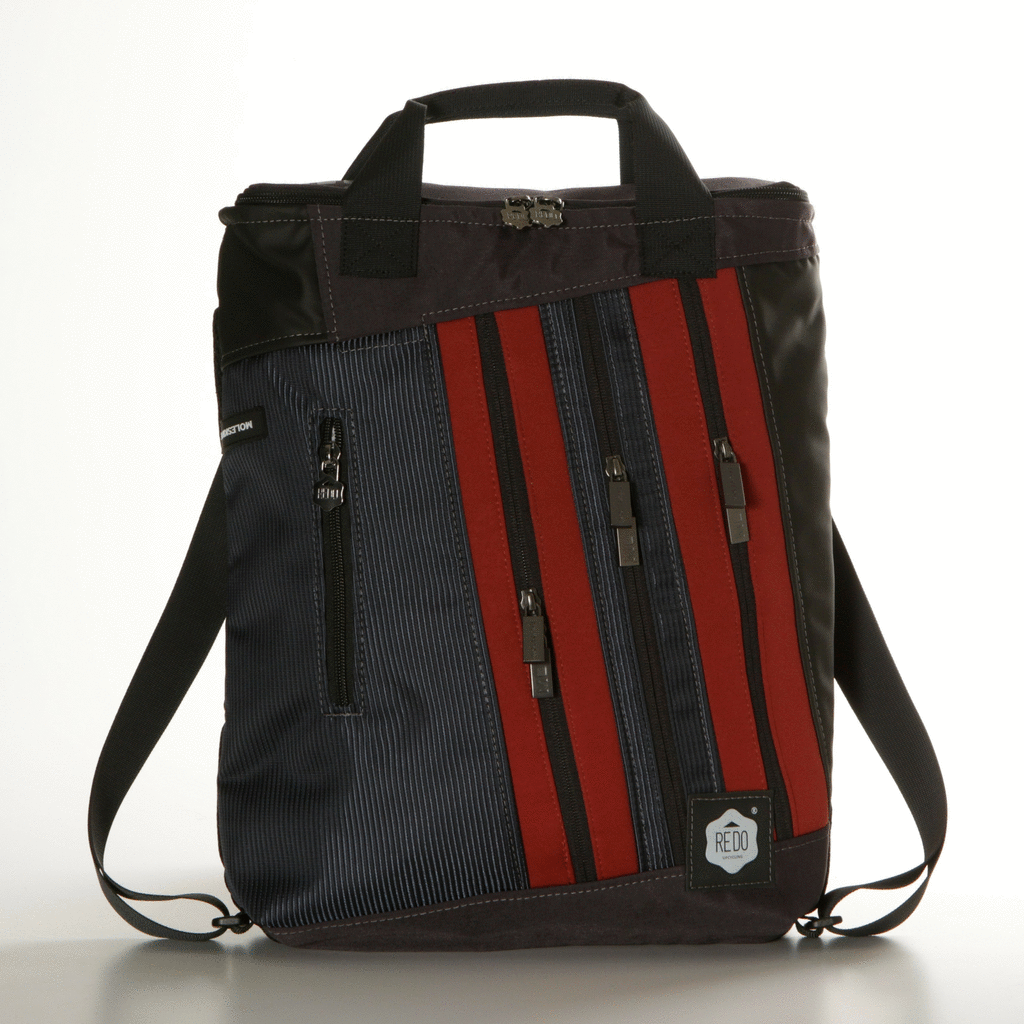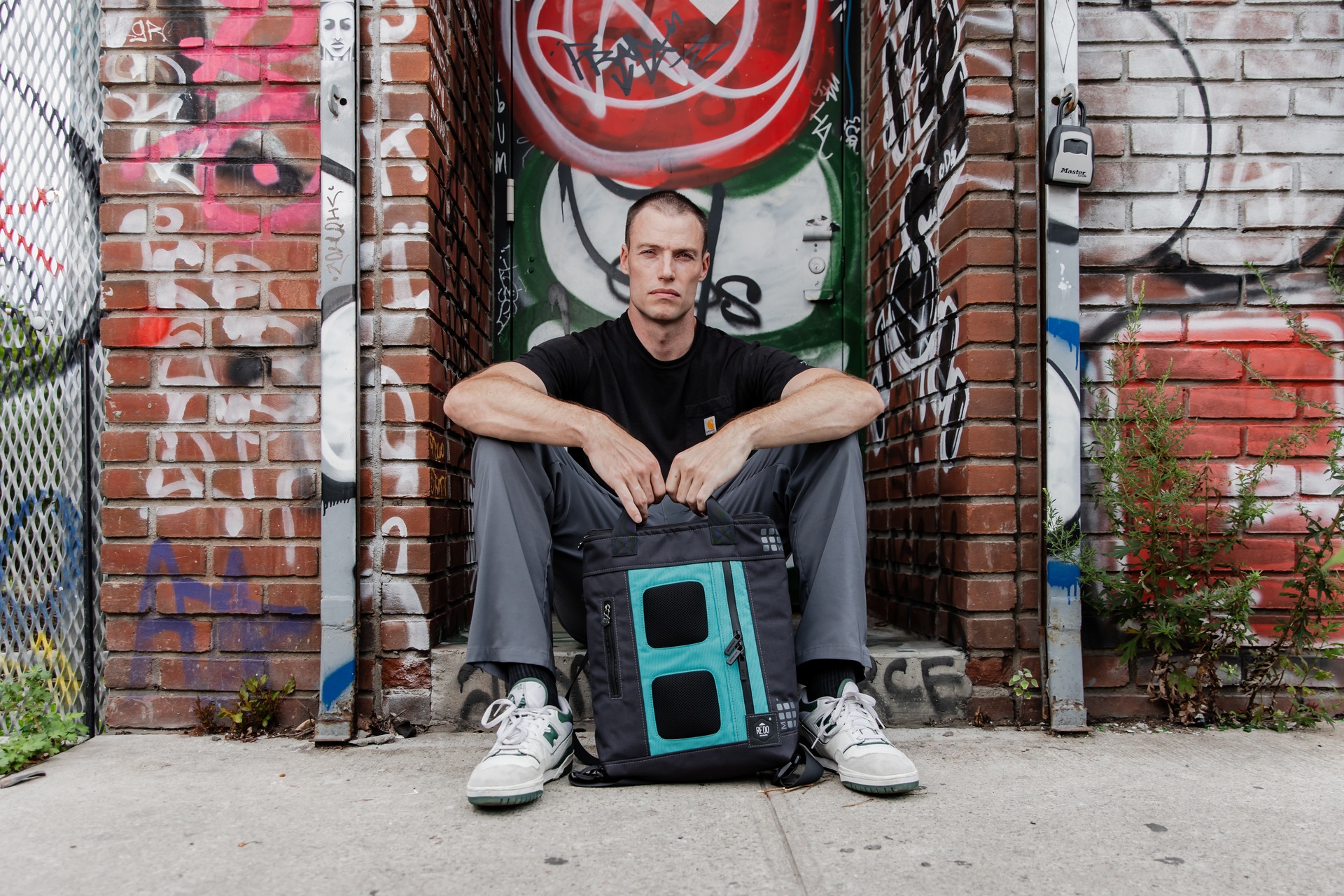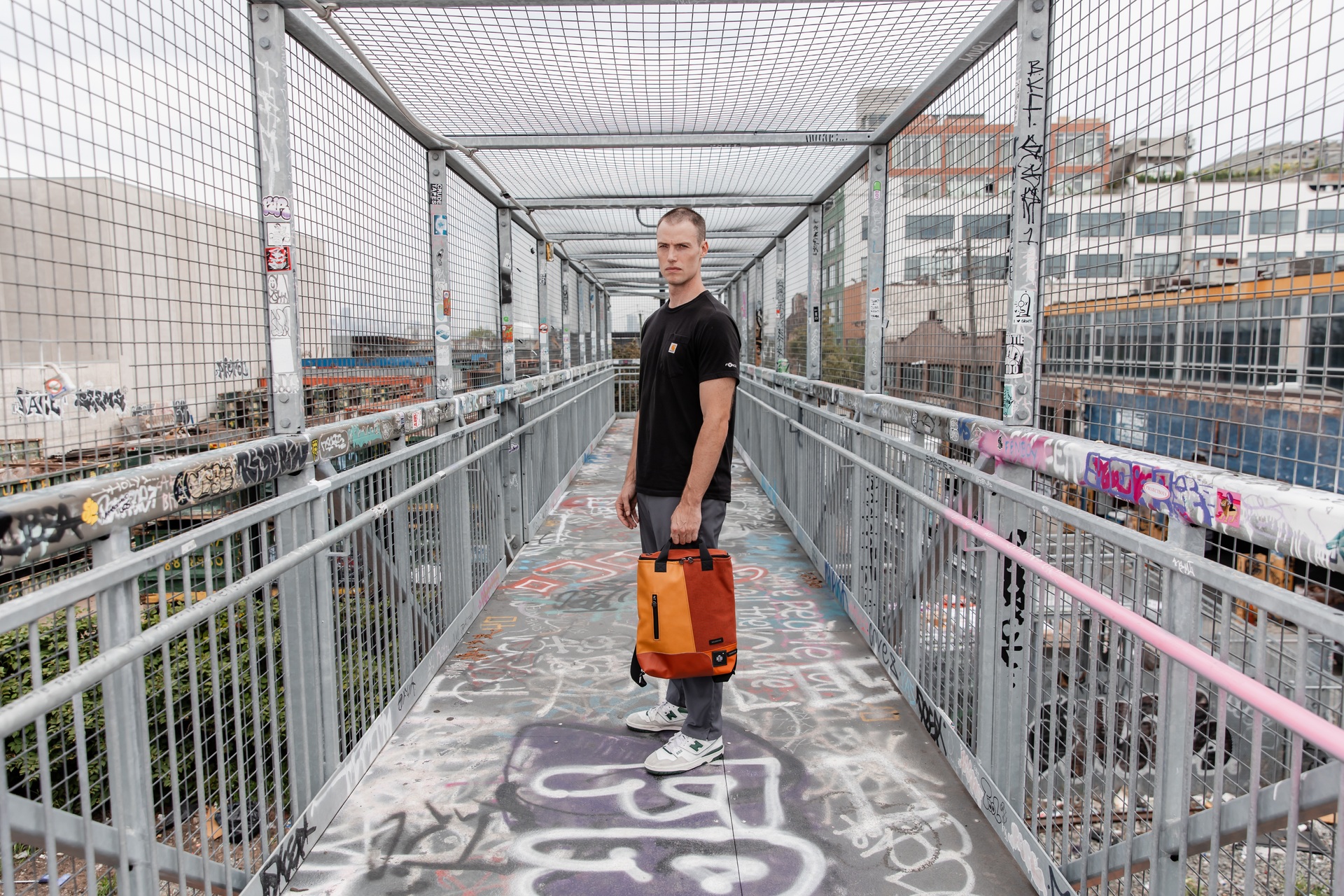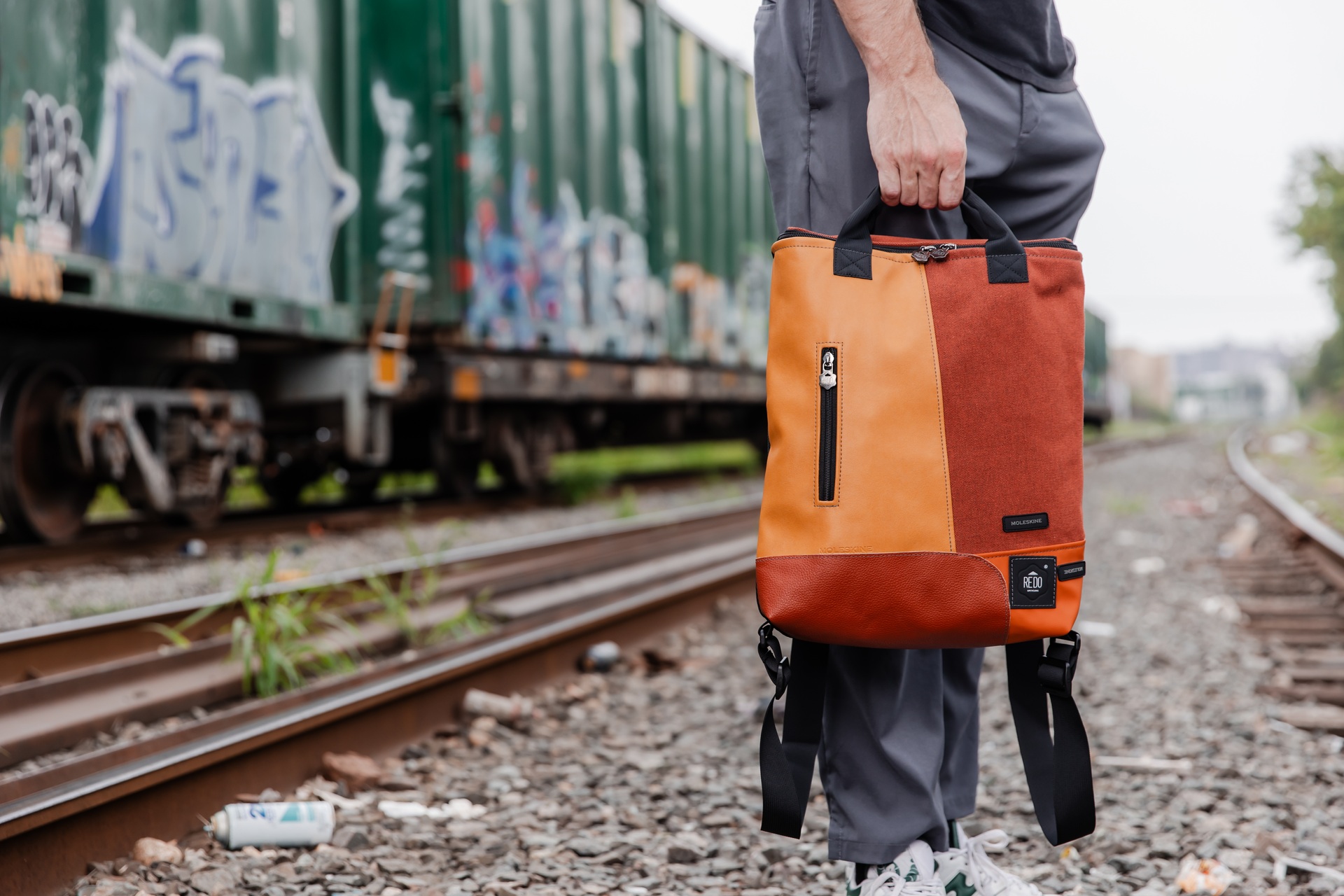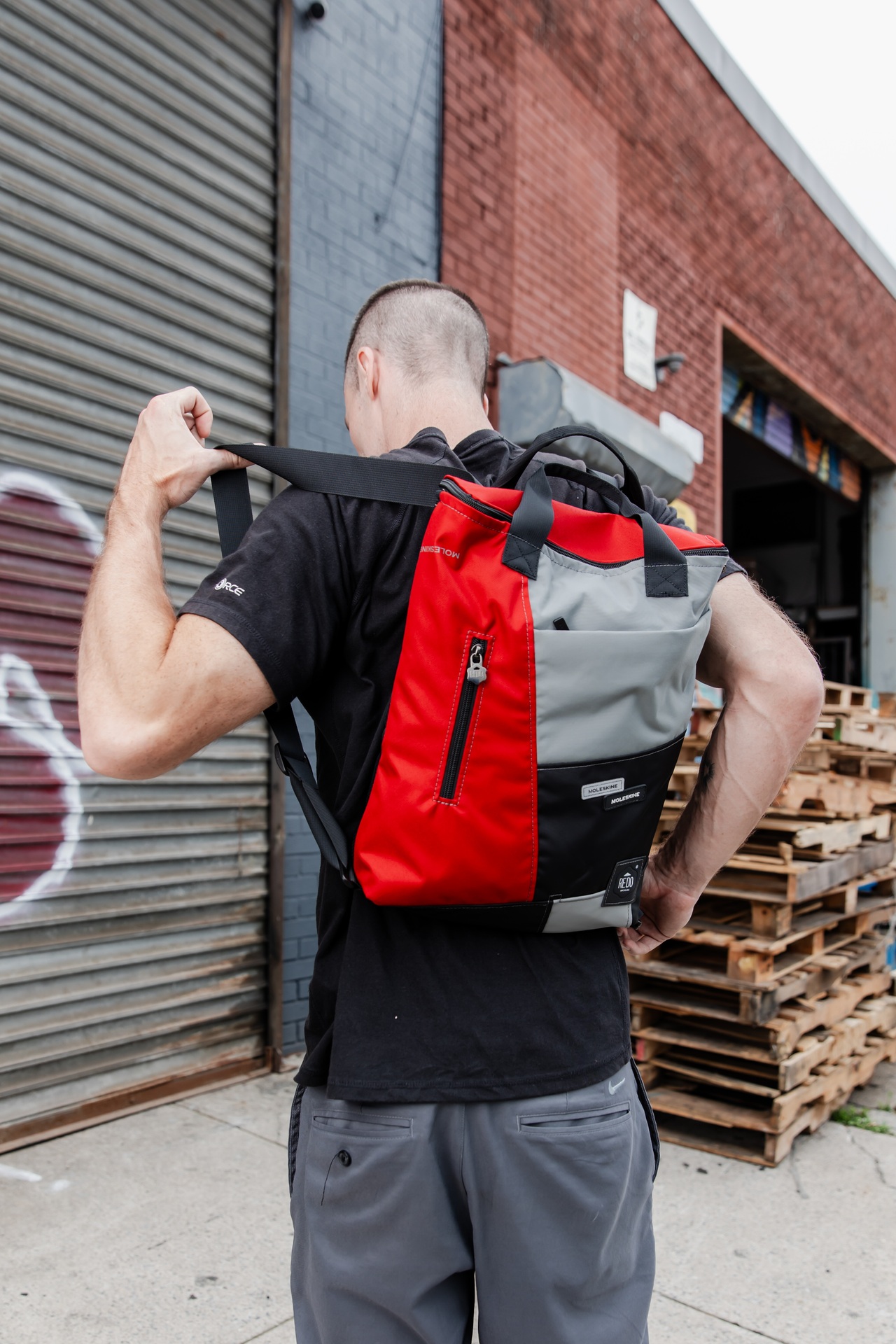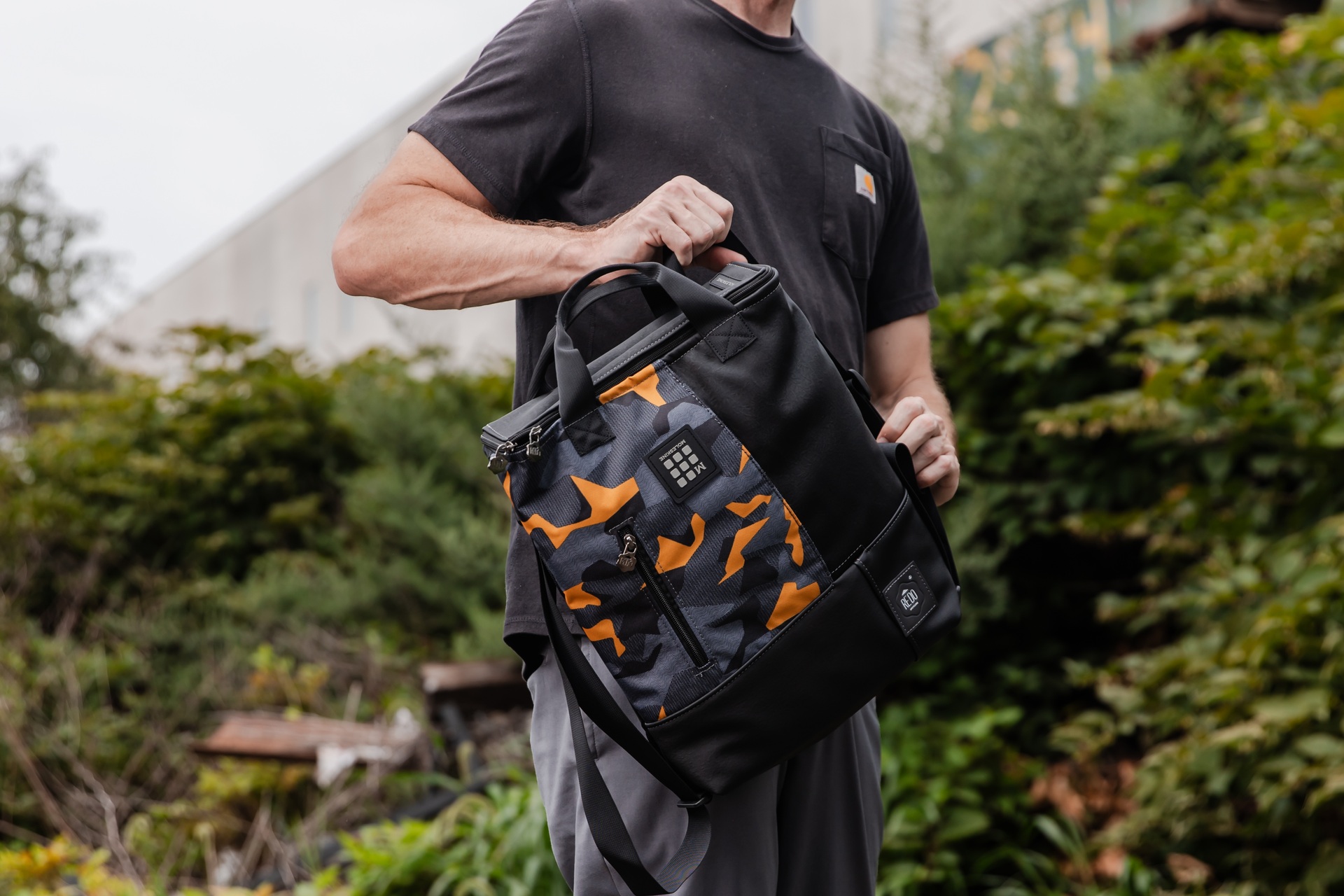Shaping a circular industrial ecosystem and supporting life-cycle thinking
REDO x Moleskine - Bags that carry more
Sustainability, circularity, innovation, cross-pollination, inclusion, design - all in one backpack
The project stems from Moleskine's challenge: to transform unsold and unmarketable fashion accessories into innovative and sustainable solutions. This led to the collaboration with Redo, a brand founded in Trento in 2014 with the goal of promoting a production process based on three R’s: Reduce, Respect, Recycle
Italy
National
Mainly urban
It refers to a physical transformation of the built environment (hard investment)
Yes
2024-12-31
No
No
No
As a representative of an organisation, in partnership with other organisations
The project was created to give a second life to unsold and non-marketable fashion accessories, such as samples, defective items, and returns. Through a structured upcycling process, these materials are transformed into new design pieces, promoting a circular economy model.
The project targets different groups. On one side, it engages vulnerable individuals in job reintegration programs, offering them employment opportunities and professional growth. On the other, it appeals to eco-conscious consumers interested in ethical and sustainable fashion solutions. Lastly, it serves as a replicable model for partner companies looking to adopt circular economy strategies.
The initiative is based on four main objectives. The first is upcycling and circular economy, which involves the recovery, dismantling, and selection of materials, their reuse for the creation of new REDO x Moleskine designs, and their commercialization in Moleskine stores across Europe and the USA, thus promoting circular fashion on an international scale. The second objective is social impact, creating job opportunities for disadvantaged individuals. The third is innovation and scalability, achieved through the combination of artisanal and industrial processes to ensure precision and quality. Finally, the project aims at market expansion, strengthening the positioning of Moleskine and REDO in the sustainable fashion sector and raising public awareness about upcycling as an alternative to linear consumption.
The results achieved demonstrate the success of the initiative. During the 2023-2024 period, 10,000 Moleskine products were recovered and transformed into 3,000 new items. The project involved 15 workers in the upcycling processes, providing them with greater job stability. Thanks to the high sales rate of regenerated products, the model has proven to be economically sustainable and is currently expanding.
The project targets different groups. On one side, it engages vulnerable individuals in job reintegration programs, offering them employment opportunities and professional growth. On the other, it appeals to eco-conscious consumers interested in ethical and sustainable fashion solutions. Lastly, it serves as a replicable model for partner companies looking to adopt circular economy strategies.
The initiative is based on four main objectives. The first is upcycling and circular economy, which involves the recovery, dismantling, and selection of materials, their reuse for the creation of new REDO x Moleskine designs, and their commercialization in Moleskine stores across Europe and the USA, thus promoting circular fashion on an international scale. The second objective is social impact, creating job opportunities for disadvantaged individuals. The third is innovation and scalability, achieved through the combination of artisanal and industrial processes to ensure precision and quality. Finally, the project aims at market expansion, strengthening the positioning of Moleskine and REDO in the sustainable fashion sector and raising public awareness about upcycling as an alternative to linear consumption.
The results achieved demonstrate the success of the initiative. During the 2023-2024 period, 10,000 Moleskine products were recovered and transformed into 3,000 new items. The project involved 15 workers in the upcycling processes, providing them with greater job stability. Thanks to the high sales rate of regenerated products, the model has proven to be economically sustainable and is currently expanding.
Social Innovation
Circular Economy
Sustainability
Fashion Revolution
Made in Italy
The REDO x Moleskine project is a concrete example of environmental sustainability in fashion, addressing the issue of waste through upcycling. Instead of generating new materials, the project recovers unsold and non-marketable fashion accessories, significantly reducing the environmental impact associated with textile production.
One of the key elements is waste reduction: existing materials are transformed into new design products, restoring value to items that would otherwise be discarded. This process prevents the disposal of defective or unsold items, reducing waste accumulation in the fashion industry and lowering CO₂ emissions related to the production of new materials.
Another fundamental aspect is the conservation of natural resources. The recovery and transformation of Moleskine accessories significantly reduce water, energy, and raw material consumption, avoiding the environmental impact of new production. The textile industry is among the most resource-intensive sectors, with high water consumption and greenhouse gas emissions, as fabric manufacturing requires vast amounts of water and energy-intensive industrial processes. By adopting upcycling, the project extends the lifecycle of existing materials, limiting the extraction of new resources and reducing the product’s ecological footprint.
Finally, the low-impact production process developed by the project combines craftsmanship and innovation to maximize resource efficiency. The optimization of recovery techniques, selective disassembly, and the requalification of textile components help extend the product lifecycle, strengthening a circular economy model that reduces the need for new production and promotes a more sustainable approach to the fashion industry.
One of the key elements is waste reduction: existing materials are transformed into new design products, restoring value to items that would otherwise be discarded. This process prevents the disposal of defective or unsold items, reducing waste accumulation in the fashion industry and lowering CO₂ emissions related to the production of new materials.
Another fundamental aspect is the conservation of natural resources. The recovery and transformation of Moleskine accessories significantly reduce water, energy, and raw material consumption, avoiding the environmental impact of new production. The textile industry is among the most resource-intensive sectors, with high water consumption and greenhouse gas emissions, as fabric manufacturing requires vast amounts of water and energy-intensive industrial processes. By adopting upcycling, the project extends the lifecycle of existing materials, limiting the extraction of new resources and reducing the product’s ecological footprint.
Finally, the low-impact production process developed by the project combines craftsmanship and innovation to maximize resource efficiency. The optimization of recovery techniques, selective disassembly, and the requalification of textile components help extend the product lifecycle, strengthening a circular economy model that reduces the need for new production and promotes a more sustainable approach to the fashion industry.
The project goes beyond environmental sustainability, integrating design, artisanal quality, and cultural experience, creating products that blend aesthetics, functionality, and symbolic value.
The aesthetic approach focuses on enhancing recovered materials, transforming them into unique accessories distinguished by a distinctive style and a narrative of regeneration. Each piece is the result of careful selection and craftsmanship, preserving the original characteristics of Moleskine materials while reinterpreting them in a contemporary way. The design is meticulously curated, ensuring a balance between minimalist aesthetics and functionality, while maintaining a visual identity consistent with the brands’ values.
From a user experience perspective, the project offers added value through its story and cultural significance. Each accessory carries a message of regeneration and environmental awareness, turning the act of purchase into a deeper and more meaningful experience. More than that, each accessory supports Moleskine’s core vision—the belief that creativity has the transformative power to change the world. It also aligns with Moleskine’s mission: to reveal and celebrate the unique genius within each of us, just as every Moleskine notebook does. Every piece is the product of the creative genius of its maker, recognized by the creative genius of the person who chooses it. This process creates a stronger bond between the object and its user, further reinforcing the perceived value of circular fashion and sustainable craftsmanship.
The project also has a significant cultural impact, promoting an aesthetic of recovery and transformation, and redefining the concept of beauty in fashion. Traditionally seen as an alternative to industrial production, upcycling here becomes a creative and innovative language.
The aesthetic approach focuses on enhancing recovered materials, transforming them into unique accessories distinguished by a distinctive style and a narrative of regeneration. Each piece is the result of careful selection and craftsmanship, preserving the original characteristics of Moleskine materials while reinterpreting them in a contemporary way. The design is meticulously curated, ensuring a balance between minimalist aesthetics and functionality, while maintaining a visual identity consistent with the brands’ values.
From a user experience perspective, the project offers added value through its story and cultural significance. Each accessory carries a message of regeneration and environmental awareness, turning the act of purchase into a deeper and more meaningful experience. More than that, each accessory supports Moleskine’s core vision—the belief that creativity has the transformative power to change the world. It also aligns with Moleskine’s mission: to reveal and celebrate the unique genius within each of us, just as every Moleskine notebook does. Every piece is the product of the creative genius of its maker, recognized by the creative genius of the person who chooses it. This process creates a stronger bond between the object and its user, further reinforcing the perceived value of circular fashion and sustainable craftsmanship.
The project also has a significant cultural impact, promoting an aesthetic of recovery and transformation, and redefining the concept of beauty in fashion. Traditionally seen as an alternative to industrial production, upcycling here becomes a creative and innovative language.
The REDO x Moleskine project represents a model of social inclusion, demonstrating how sustainability and social impact can be integral parts of an innovative and replicable business model.
Job inclusion is the core of the initiative. Cooperativa A.L.P.I., owner of the REDO brand, provides employment and professional training opportunities to people in vulnerable situations, including individuals referred by social and healthcare services. Through a structured pathway, workers develop technical and transversal skills that improve their job prospects, fostering greater economic independence and social integration.
Inclusion also extends to the concept of design for all, a central principle of the project. Upcycled production ensures that each product is unique, highlighting diversity and individuality in contrast to the standardized production typical of traditional fashion. Attention to detail and artisanal quality guarantee items designed to last over time, promoting more conscious consumption and moving away from the fast fashion model.
Another key aspect is economic accessibility. The REDO model optimizes resources and reduces costs through upcycling, allowing the creation of design products at fair prices. This approach makes sustainable fashion more accessible, eliminating economic barriers that often limit its reach and enabling a broader audience to choose ethical solutions without compromising on quality and aesthetics.
Economic inclusion is not only about consumers but is embedded in the very structure of the project, which is based on a cooperative model. A.L.P.I. places the value of work at the center of its mission, seeing it as a tool for inclusion. The goal is not only environmental sustainability but also social and economic sustainability, ensuring dignified employment opportunities and professional growth paths for the people involved.
Job inclusion is the core of the initiative. Cooperativa A.L.P.I., owner of the REDO brand, provides employment and professional training opportunities to people in vulnerable situations, including individuals referred by social and healthcare services. Through a structured pathway, workers develop technical and transversal skills that improve their job prospects, fostering greater economic independence and social integration.
Inclusion also extends to the concept of design for all, a central principle of the project. Upcycled production ensures that each product is unique, highlighting diversity and individuality in contrast to the standardized production typical of traditional fashion. Attention to detail and artisanal quality guarantee items designed to last over time, promoting more conscious consumption and moving away from the fast fashion model.
Another key aspect is economic accessibility. The REDO model optimizes resources and reduces costs through upcycling, allowing the creation of design products at fair prices. This approach makes sustainable fashion more accessible, eliminating economic barriers that often limit its reach and enabling a broader audience to choose ethical solutions without compromising on quality and aesthetics.
Economic inclusion is not only about consumers but is embedded in the very structure of the project, which is based on a cooperative model. A.L.P.I. places the value of work at the center of its mission, seeing it as a tool for inclusion. The goal is not only environmental sustainability but also social and economic sustainability, ensuring dignified employment opportunities and professional growth paths for the people involved.
The project involved citizens, guiding them toward a more conscious purchasing model based on sustainability, circular economy and social justice. Through the creation of regenerated products, not only does it reduce waste, but it also offers consumers the opportunity to make more responsible choices, contributing to a fairer and more sustainable economic system. This experience was supported by a targeted communication campaign, using various social media and web tools, along with the distribution of a newsletter to approximately 1,500,000 subscribers of the Moleskine portal. Each purchase becomes an act of active participation, capable of influencing the market and encouraging companies to rethink their environmental and social impact.
This initiative fosters a cultural shift in the way society relates to consumption. Purchasing this product is not just an aesthetic choice but a conscious act that supports reuse, reduces environmental impact and promotes social inclusion. In this way, citizens become agents of change, choosing products that respect the environment and value the work of those involved in the production processes.
Another innovative element is the collaboration between the profit and non-profit sectors. Companies like Moleskine and a social cooperative like A.L.P.I. demonstrate that two entities with different objectives can join forces to create a mutually beneficial model. On one hand, the profit sector integrates credible and effective sustainability strategies into its business. On the other, the non-profit sector gains new skills and opportunities, strengthening its social impact. This synergy not only proves that sustainability and inclusion can be economically viable but also provides a concrete example of how businesses and civil society can work together to build a fairer and more responsible economy.
This initiative fosters a cultural shift in the way society relates to consumption. Purchasing this product is not just an aesthetic choice but a conscious act that supports reuse, reduces environmental impact and promotes social inclusion. In this way, citizens become agents of change, choosing products that respect the environment and value the work of those involved in the production processes.
Another innovative element is the collaboration between the profit and non-profit sectors. Companies like Moleskine and a social cooperative like A.L.P.I. demonstrate that two entities with different objectives can join forces to create a mutually beneficial model. On one hand, the profit sector integrates credible and effective sustainability strategies into its business. On the other, the non-profit sector gains new skills and opportunities, strengthening its social impact. This synergy not only proves that sustainability and inclusion can be economically viable but also provides a concrete example of how businesses and civil society can work together to build a fairer and more responsible economy.
The project has generated an impact that has extended across multiple levels, indirectly involving a network of stakeholders who have contributed to strengthening its sustainability and dissemination.
At the territorial level, the project has had a significant impact on individuals participating in job placement programs, thanks to collaboration with local social and healthcare services that referred workers in vulnerable situations. This model has enabled the creation of a virtuous cycle between institutions, the third sector, and businesses, transforming a production initiative into a concrete opportunity for social inclusion.
The local community has responded positively to the project, showing a growing interest in sustainable fashion products. The sale of regenerated products has encouraged greater citizen engagement as conscious consumers, strengthening the demand for solutions based on the circular economy.
On a broader scale, the project aligns with the increasing global focus on sustainability, receiving indirect support from third-sector networks, social cooperatives, and industry associations committed to promoting circular economy models. Collaboration with other organizations in the sector has facilitated the exchange of best practices, contributing to the project’s visibility and creating new opportunities for partnerships with companies interested in the responsible management of textile waste.
The business sector has also shown interest in the REDO model, demonstrating that the dialogue between profit and non-profit can generate shared value, benefiting both corporate sustainability and social impact.
The integration of the project into Moleskine stores across Europe and the USA has enabled the large-scale dissemination of upcycling and responsible production values, raising awareness among an international audience about the importance of making more conscious consumption choices.
At the territorial level, the project has had a significant impact on individuals participating in job placement programs, thanks to collaboration with local social and healthcare services that referred workers in vulnerable situations. This model has enabled the creation of a virtuous cycle between institutions, the third sector, and businesses, transforming a production initiative into a concrete opportunity for social inclusion.
The local community has responded positively to the project, showing a growing interest in sustainable fashion products. The sale of regenerated products has encouraged greater citizen engagement as conscious consumers, strengthening the demand for solutions based on the circular economy.
On a broader scale, the project aligns with the increasing global focus on sustainability, receiving indirect support from third-sector networks, social cooperatives, and industry associations committed to promoting circular economy models. Collaboration with other organizations in the sector has facilitated the exchange of best practices, contributing to the project’s visibility and creating new opportunities for partnerships with companies interested in the responsible management of textile waste.
The business sector has also shown interest in the REDO model, demonstrating that the dialogue between profit and non-profit can generate shared value, benefiting both corporate sustainability and social impact.
The integration of the project into Moleskine stores across Europe and the USA has enabled the large-scale dissemination of upcycling and responsible production values, raising awareness among an international audience about the importance of making more conscious consumption choices.
The project was born from the encounter between different worlds, intertwining to create an innovative model of sustainable production, social inclusion, and cross-sector collaboration. The areas of knowledge integrated into the design and implementation of the project include:
-Social economy and cooperation – A.L.P.I.’s cooperative model ensures an approach based on active participation, value redistribution, and the creation of job opportunities for people in vulnerable situations.
- Business management and sustainable supply chain – Moleskine brings strategic expertise in industrial and commercial sectors, ensuring high production standards and positioning the project within an international market focused on sustainability.
- Circular design and manufacturing – The design process follows principles of reuse and regeneration, enhancing recovered materials and promoting a low-impact production cycle.
- Training and skills development – Job placement is not just an employment opportunity but also a professional and personal growth journey, providing on-the-job training and fostering the acquisition of both technical and transversal skills.
The integration of these fields of knowledge has been achieved through a structured collaboration, where each actor has contributed its know-how, shaping an innovative, ethical, and replicable production model. This multidisciplinary interaction has generated significant added value: it is not just a production project but a model demonstrating how the sharing of skills and resources can drive change, fostering social and economic regeneration through a participatory and sustainable approach.
-Social economy and cooperation – A.L.P.I.’s cooperative model ensures an approach based on active participation, value redistribution, and the creation of job opportunities for people in vulnerable situations.
- Business management and sustainable supply chain – Moleskine brings strategic expertise in industrial and commercial sectors, ensuring high production standards and positioning the project within an international market focused on sustainability.
- Circular design and manufacturing – The design process follows principles of reuse and regeneration, enhancing recovered materials and promoting a low-impact production cycle.
- Training and skills development – Job placement is not just an employment opportunity but also a professional and personal growth journey, providing on-the-job training and fostering the acquisition of both technical and transversal skills.
The integration of these fields of knowledge has been achieved through a structured collaboration, where each actor has contributed its know-how, shaping an innovative, ethical, and replicable production model. This multidisciplinary interaction has generated significant added value: it is not just a production project but a model demonstrating how the sharing of skills and resources can drive change, fostering social and economic regeneration through a participatory and sustainable approach.
The REDO x Moleskine project stands out for its innovative approach, capable of overcoming the traditional divide between social economy and the profit sector, between industrial production and social inclusion. Unlike conventional initiatives, where profit-driven companies often support social projects through donations or external collaborations, REDO x Moleskine builds a production model in which a social enterprise and an international brand work together in a relationship of mutual exchange and value creation.
Job inclusion is not an accessory element but the core of the production process: people in vulnerable situations do not hold marginal roles but are actively involved in creating high-quality products designed for the global market.
Moreover, Moleskine does not merely support the project as a corporate social responsibility initiative but integrates REDO into its value chain, proving that a competitive business model can also be inclusive and sustainable. Social and environmental value is not an expense to be absorbed but a strategic resource that enhances product quality and strengthens brand reputation. Additionally, the final product meets market standards, challenging the misconception that a socially driven initiative must necessarily lower its ambitions in terms of excellence and design.
The project also redefines the concept of sustainability in fashion. Beyond reducing environmental impact, REDO x Moleskine generates social value, creating a production cycle in which every phase brings positive impact. In stark contrast to the fast fashion model, it promotes a system based on quality, durability, and professional growth. It is not just a responsible alternative but a replicable and scalable model, capable of reshaping market rules and demonstrating that business can be a driving force for social innovation, sustainability, and economic resilience.
Job inclusion is not an accessory element but the core of the production process: people in vulnerable situations do not hold marginal roles but are actively involved in creating high-quality products designed for the global market.
Moreover, Moleskine does not merely support the project as a corporate social responsibility initiative but integrates REDO into its value chain, proving that a competitive business model can also be inclusive and sustainable. Social and environmental value is not an expense to be absorbed but a strategic resource that enhances product quality and strengthens brand reputation. Additionally, the final product meets market standards, challenging the misconception that a socially driven initiative must necessarily lower its ambitions in terms of excellence and design.
The project also redefines the concept of sustainability in fashion. Beyond reducing environmental impact, REDO x Moleskine generates social value, creating a production cycle in which every phase brings positive impact. In stark contrast to the fast fashion model, it promotes a system based on quality, durability, and professional growth. It is not just a responsible alternative but a replicable and scalable model, capable of reshaping market rules and demonstrating that business can be a driving force for social innovation, sustainability, and economic resilience.
The project is built upon the integration of three fundamental elements that define the vision and work of Cooperativa A.L.P.I.: social commitment, the cooperative model, and business management. These three dimensions, usually distinct, come together in an innovative approach capable of generating economic, environmental, and social value in a sector traditionally distant from such principles: fashion.
At the core of the project lies its strong social impact, materialized through a job placement model for people in vulnerable situations. It is not just about a sustainable production initiative but a true platform for training and professional growth.
This mission is supported by the cooperative model, the project's second pillar. As a social cooperative, A.L.P.I. places people and resource-sharing at the center, moving beyond the logic of maximizing individual profit. Work is organized according to principles of participation, equity, and value redistribution, ensuring job stability and fostering a sense of belonging to a collective project, where success is not only economic but also social and community-driven.
However, the effectiveness of this model would be limited without a strong entrepreneurial vision, the third key element of the project. The collaboration with Moleskine, a globally recognized brand, demonstrates that the social economy can engage with the profit sector without losing its essence but rather strengthening its impact.
The integration of social dimension, cooperation, and entrepreneurship has given rise to a replicable and scalable production model with the potential to expand into other sectors. It represents a tangible opportunity to promote inclusion and enhance resources through reuse and regeneration.
At the core of the project lies its strong social impact, materialized through a job placement model for people in vulnerable situations. It is not just about a sustainable production initiative but a true platform for training and professional growth.
This mission is supported by the cooperative model, the project's second pillar. As a social cooperative, A.L.P.I. places people and resource-sharing at the center, moving beyond the logic of maximizing individual profit. Work is organized according to principles of participation, equity, and value redistribution, ensuring job stability and fostering a sense of belonging to a collective project, where success is not only economic but also social and community-driven.
However, the effectiveness of this model would be limited without a strong entrepreneurial vision, the third key element of the project. The collaboration with Moleskine, a globally recognized brand, demonstrates that the social economy can engage with the profit sector without losing its essence but rather strengthening its impact.
The integration of social dimension, cooperation, and entrepreneurship has given rise to a replicable and scalable production model with the potential to expand into other sectors. It represents a tangible opportunity to promote inclusion and enhance resources through reuse and regeneration.
The project represents an innovative and scalable model, whose key elements can be replicated in other contexts, involving different beneficiary groups and production sectors. Its transferability is based on an inclusive methodological approach, a sustainable production process, and a collaborative framework between social enterprises and the profit sector, which can be adapted to various realities.
One of the most replicable aspects is the job placement model based on on-the-job training, which allows people in vulnerable situations to acquire concrete skills in a real production environment. This approach can be applied to sectors such as design, craftsmanship, the circular economy, or sustainable manufacturing, creating professional growth opportunities for different categories of disadvantaged workers.
The material regeneration process and circular production model are also easily transferable. The model demonstrates that it is possible to transform recovered materials into high-quality products, enhancing artisanal work and promoting circular economy practices. This methodology can be applied in areas such as furniture, textiles, or sustainable fashion, contributing to waste reduction and encouraging more conscious consumption.
Another replicable element is the collaboration model between social enterprises and profit-driven brands, which goes beyond traditional corporate social responsibility by genuinely integrating job inclusion into a value chain. This approach can be adapted across different sectors, offering companies the opportunity to combine competitiveness with social impact and proving that sustainability and market success are not in conflict but can, in fact, reinforce each other.
Finally, the project has generated a transferable knowledge and skills related to managing an ethical and sustainable production model. These best practices can be used to create training programs, workshops or guidelines to help other organisations.
One of the most replicable aspects is the job placement model based on on-the-job training, which allows people in vulnerable situations to acquire concrete skills in a real production environment. This approach can be applied to sectors such as design, craftsmanship, the circular economy, or sustainable manufacturing, creating professional growth opportunities for different categories of disadvantaged workers.
The material regeneration process and circular production model are also easily transferable. The model demonstrates that it is possible to transform recovered materials into high-quality products, enhancing artisanal work and promoting circular economy practices. This methodology can be applied in areas such as furniture, textiles, or sustainable fashion, contributing to waste reduction and encouraging more conscious consumption.
Another replicable element is the collaboration model between social enterprises and profit-driven brands, which goes beyond traditional corporate social responsibility by genuinely integrating job inclusion into a value chain. This approach can be adapted across different sectors, offering companies the opportunity to combine competitiveness with social impact and proving that sustainability and market success are not in conflict but can, in fact, reinforce each other.
Finally, the project has generated a transferable knowledge and skills related to managing an ethical and sustainable production model. These best practices can be used to create training programs, workshops or guidelines to help other organisations.
The project addresses some of the most pressing global challenges through concrete solutions applied at the local level. Its innovation lies in its ability to integrate social inclusion, environmental sustainability, and collaboration between social enterprises and the profit sector, demonstrating that this can be a successful model.
One of the main challenges concerns access to dignified work for people in vulnerable situations. Globally, many categories of workers are excluded from the job market, often due to a lack of training opportunities. The project moves beyond a welfare-based approach and offers a training model based on socio-professional inclusion, enabling individuals to acquire concrete and marketable skills.
Another key issue is the transition towards a circular economy in fashion, one of the most polluting industries in the world. The project proves that it is possible to transform recovered materials into high-quality products, reducing waste and introducing a new cultural paradigm in consumption. The adopted approach not only lowers environmental impact but also promotes a production model that values both design and social sustainability.
A further challenge tackled is overcoming the divide between social enterprises and the profit sector. Traditionally, these two worlds operate on parallel tracks, with the profit sector often limiting itself to corporate social responsibility (CSR) initiatives that remain disconnected from the core business. The project demonstrates that genuine integration is possible, where an international brand adopts an inclusive and sustainable model.
The project contributes to strengthening local economies and communities, countering outsourcing and the decline of traditional manufacturing sectors. The recovery of artisanal skills and the creation of an ecosystem based on sustainability show that high-quality work can remain rooted in local territories, generating a positive impact on a global scale.
One of the main challenges concerns access to dignified work for people in vulnerable situations. Globally, many categories of workers are excluded from the job market, often due to a lack of training opportunities. The project moves beyond a welfare-based approach and offers a training model based on socio-professional inclusion, enabling individuals to acquire concrete and marketable skills.
Another key issue is the transition towards a circular economy in fashion, one of the most polluting industries in the world. The project proves that it is possible to transform recovered materials into high-quality products, reducing waste and introducing a new cultural paradigm in consumption. The adopted approach not only lowers environmental impact but also promotes a production model that values both design and social sustainability.
A further challenge tackled is overcoming the divide between social enterprises and the profit sector. Traditionally, these two worlds operate on parallel tracks, with the profit sector often limiting itself to corporate social responsibility (CSR) initiatives that remain disconnected from the core business. The project demonstrates that genuine integration is possible, where an international brand adopts an inclusive and sustainable model.
The project contributes to strengthening local economies and communities, countering outsourcing and the decline of traditional manufacturing sectors. The recovery of artisanal skills and the creation of an ecosystem based on sustainability show that high-quality work can remain rooted in local territories, generating a positive impact on a global scale.
In the 2023-2024 period, the project recovered approximately 10,000 unsold or defective Moleskine items, transforming them into 3,000 new products through an advanced upcycling process. This initiative contributed to reducing textile waste and optimizing resources, demonstrating that environmental sustainability and economic value can go hand in hand.
From an employment perspective, 15 workers in social inclusion programs were involved in production, receiving specialized training and opportunities for job stabilization. Currently, the REDO upcycling brand employs 35 people, 28 of whom are engaged in job placement programs, highlighting the project's long-term structural impact.
The project also generated direct economic benefits: nearly all the products created were sold, ensuring an immediate return on investment and proving that an ethical production model can also be economically sustainable. Visibility in Moleskine stores across Europe and the USA strengthened REDO upcycling's market positioning, opening up new collaboration opportunities with other brands.
The project's direct beneficiaries are primarily individuals in job inclusion programs, who gained access to hands-on training, the development of artisanal and digital skills, and a concrete opportunity for labor market integration. The project also had a positive impact on the production team, which was able to work with new technologies and improve process quality and efficiency.
Indirectly, the project influenced the circular economy sector by demonstrating that material recovery and enhancement can become an integral part of an international brand's strategy. Additionally, consumers who purchased REDO x Moleskine products actively participated in a more responsible and conscious consumption model.
From an employment perspective, 15 workers in social inclusion programs were involved in production, receiving specialized training and opportunities for job stabilization. Currently, the REDO upcycling brand employs 35 people, 28 of whom are engaged in job placement programs, highlighting the project's long-term structural impact.
The project also generated direct economic benefits: nearly all the products created were sold, ensuring an immediate return on investment and proving that an ethical production model can also be economically sustainable. Visibility in Moleskine stores across Europe and the USA strengthened REDO upcycling's market positioning, opening up new collaboration opportunities with other brands.
The project's direct beneficiaries are primarily individuals in job inclusion programs, who gained access to hands-on training, the development of artisanal and digital skills, and a concrete opportunity for labor market integration. The project also had a positive impact on the production team, which was able to work with new technologies and improve process quality and efficiency.
Indirectly, the project influenced the circular economy sector by demonstrating that material recovery and enhancement can become an integral part of an international brand's strategy. Additionally, consumers who purchased REDO x Moleskine products actively participated in a more responsible and conscious consumption model.

